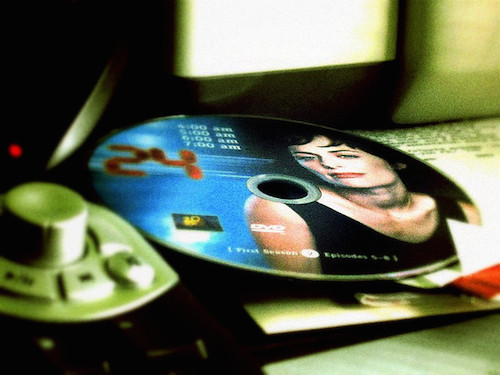The TV box set is a thing. It’s so much a thing that it has now detached itself from its own material: a box set is no longer a TV series collected as a set and presented in a box, it is now simply the thing, collected, and placed in a set completely agnostic to the process of boxing. Here’s an example: Sky TV actively promotes watching “box sets” as part of its online services. So you can watch a box set on a computer without ever seeing a box, because the box doesn’t exist except as a metaphor within the marketing material. When I challenged them as to how a video on the Internet could be described as being in a box, Sky’s social media people seemed confused by the question as though through some Orwellian process a box set had always never been in a box.
But why should a company like Sky be so keen to sell us a TV box set in the first place? Well Sky are a very shrewd and successful media company and so they know about things like supply and demand. They also know about trend-spotting and how to make the most of changes in viewing practices. They’ve spotted that you like box sets of glossy telly – they probably knew you liked TV box sets before you did – and so they want to sell them to you.
Now TV box sets have been around for a long time as anyone who has ever been to Oxfam will tell you (next time you’re in there go and find the VHS set of an early season of Friends that they will have definitely have in) but they didn’t really become a thing until the turn of the century.
Over the past ten or fifteen years the box set has become an important part of our TV viewing and purchasing practices. The box set has spawned long running broadsheet columns which simultaneously chronicle and feed our love of the box set as a format (the Guardian’s ’your next box set’ being a prime example). If we looked into it I bet we’d find that box set sales have helped prop up HMV as it lurches drunkenly towards high street oblivion, especially at Christmas time because we all know that things become intrinsically more gift like when they are placed in a prepackaged box (how else to explain the fact that last Christmas I bought a mere one pint of supermarket lager for my brother in law for £10 – a premium of around 350% – because it happened to be in a tin?). Box set viewing seems to be a cultural practice that touches all parts of society. On the one hand my Mum has a penchant for nostalgic reissue box sets of TV shows from the 1980s while on the other Sarah Ferguson and her kids apparently spend whole weekends under a duvet watching them (well, let’s face it, they’ve not got much else to do unless a King Ralph level catastrophe happens).
At the heart of much of the cult of the box set is the concept of “the marathon”: the practice of gorging oneself on telly, as enabled by the presence of a great deal of it. In a box.
And I think it’s fair to say that we wouldn’t have the box set marathon, nor indeed the strangely remediated idea of a box set that is not in a box, if it wasn’t for England’s second city. For you see it was in North Birmingham that the first seeds of the box set as a phenomenon were sown for it was there that the actor Martin Shaw grew up and first learnt his craft.
In his early career he leant a hand with a little television series called something like The Coronation Street – some sort of provincial northern morality play, I think – before putting in some solid work as the face of the Ford Capri. Other work in television and the theatre followed. Then in 1977 the dashing young brummie was cast as Doyle, of Bodie and Doyle fame, in the action series The Professionals, the series to which we must now draw our attention.
The Professionals was the story of right wing super cops who work outside the rules to stop nuclear bombs and if that sounds familiar it’s because in Shaw’s performance here we see the template for Jack Bauer, and in the show we see many of the hallmarks of Jack’s own show, 24. Bodie, Doyle, Bauer: poster boys for robust methods, for being uncompromising, tough and doing the unthinkable. And if they can be tough and do the unthinkable to someone who is brown, well all the better.
It was 24 that heralded the new dawn of the box set (it even earned a namecheck as Her Royal Ferg’s favourite one). This groundbreaking American show took the fascist police state fantasies of The Professionals and wedded them to a powerful hook: real time. 24 provides a one season long story arc, delivered as one hour of television per one hour of narrative. The Professionals was a serial, giving complete narratives in each episode, but 24 offered us weekly riddles, not weekly solutions, which were cleverly tied to the beat of a clock that was always counting, pushing us on, on, on. As an audience we wanted to watch more, more, more, more and so 24 in box set form was hard to resist. The box set marathon was born.
The case then is made, and it’s a simple one: no Birmingham, no Martin Shaw, and no Professionals; no CI5, no CTU, no Jack Bauer and no 24; no 24 no TV box set marathons.
No Birmingham? I really don’t know what Sarah Ferguson would do with her time.
Image cc Sujay

